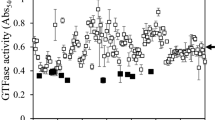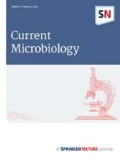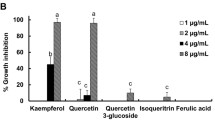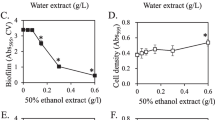Abstract.
Formation of dental caries is caused by the colonization and accumulation of oral microorganisms and extracellular polysaccharides that are synthesized from sucrose by glucosyltransferase of Streptococcus mutans. The production of glucosyltransferase from oral microorganisms was attempted, and it was found that Streptococcus mutans produced highest activity of the enzyme. Ethanolic extracts of propolis (EEP) were examined whether EEP inhibit the enzyme activity and growth of the bacteria or not. All EEP from various regions in Brazil inhibited both glucosyltransferase activity and growth of S. mutans, but one of the propolis from Rio Grande do Sul (RS2) demonstrated the highest inhibition of the enzyme activity and growth of the bacteria. It was also found that propolis (RS2) contained the highest concentrations of pinocembrin and galangin.
Similar content being viewed by others

Author information
Authors and Affiliations
Additional information
Received: 8 June 1997 / Accepted: 7 July 1997
Rights and permissions
About this article
Cite this article
Park, Y., Koo, M., Abreu, J. et al. Antimicrobial Activity of Propolis on Oral Microorganisms. Curr Microbiol 36, 24–28 (1998). https://doi.org/10.1007/s002849900274
Issue Date:
DOI: https://doi.org/10.1007/s002849900274



